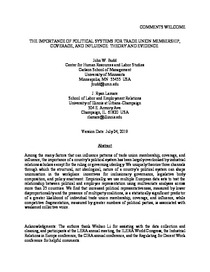The importance of political systems for trade union membership coverage, and influence: theory and evidence
"Among the many factors that can influence patterns of trade union membership, coverage, and influence, the importance of a country’s political system has been largely overlooked by industrial relations scholars except for the ruling or governing ideology. We uniquely theorize three channels th...
| Main Authors: | , |
|---|---|
| Institution: | ETUI-European Trade Union Institute |
| Format: | TEXT |
| Language: | English |
| Published: |
Luxembourg
2019
|
| Subjects: | |
| Online Access: | https://www.labourline.org/KENTIKA-19309030124911272129-The-importance-of-political-sy.htm |
| Summary: | "Among the many factors that can influence patterns of trade union membership, coverage, and influence, the importance of a country’s political system has been largely overlooked by industrial relations scholars except for the ruling or governing ideology. We uniquely theorize three channels through which the structural, not ideological, nature of a country’s political system can shape unionization in the workplace: incentives for inclusionary governance, legislative body composition, and policy enactment. Empirically, we use multiple European data sets to test the relationship between political and employee representation using multivariate analyses across more than 25 countries. We find that increased political representativeness, measured by lower disproportionality and the presence of multiparty coalitions, is a statistically significant predictor of a greater likelihood of individual trade union membership, coverage, and influence, while competitive fragmentation, measured by greater numbers of political parties, is associated with weakened collective voice." |
|---|---|
| Physical Description: | 54 p. Digital |

